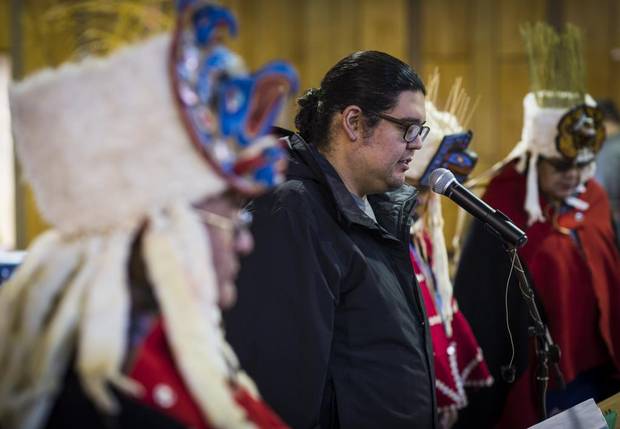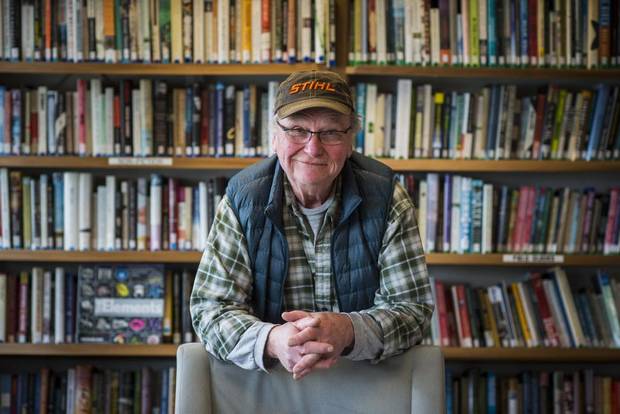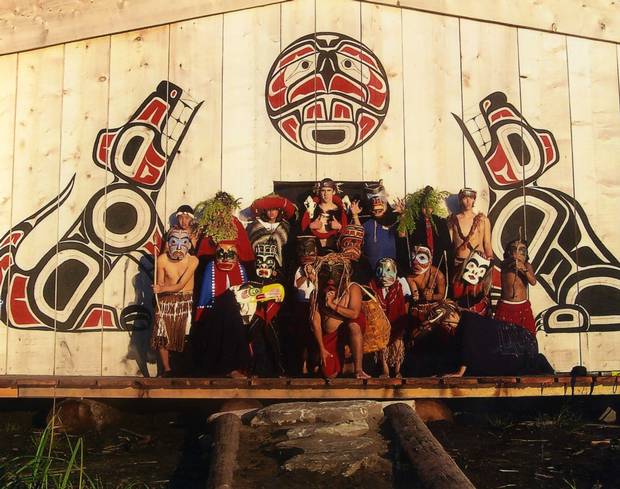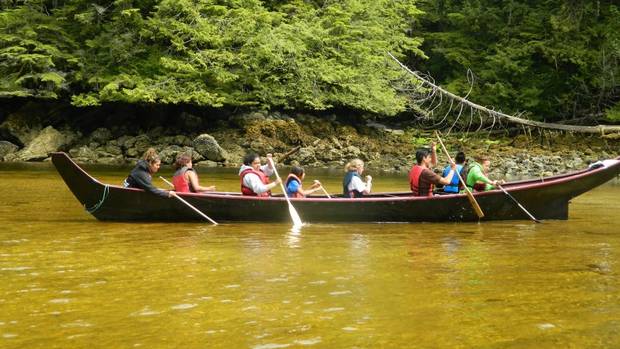Surrounded by hereditary chiefs wearing full regalia, Rory Housty looked underdressed in his T-shirt and ski jacket when he welcomed B.C. Premier Christy Clark and other dignitaries to his community recently for an important signing ceremony.
But the packed hall fell into a respectful silence when the young man delivered a prayer in the Heiltsuk tongue. The people in the world who can fluently speak the Heiltsuk-Oowekyala language would fill a small bus, and Mr. Housty, at 27, is one of the youngest of them.
Mr. Housty credits a local youth program, the Koeye culture camp, with anchoring him to his culture. It is a remarkable achievement that this exposure – about 20 years ago – could connect him to his remote community on the central coast of B.C., because he would spend most of the next 15 years far from home.

Rory Housty, a former participant in the Qqs Project Society’s Koeye culture camp, during a ceremony in Bella Bella in January.
John Lehmann/The Globe and Mail
The camp, along with an array of spinoff programs, is run by the Qqs Projects Society, established by Larry Jorgenson. A white guy, an outsider, Mr. Jorgenson seemed to be on a bureaucratic career path before he visited Bella Bella 35 years ago. He was working in Alberta re-organizing the province's mental health programs and had done similar work in Ontario. When he arrived on the coast, he found a community in crisis, enduring an average of one youth suicide every month. At the urging of the school principal, Mr. Jorgenson sold everything and moved to the isolated community, accessible only by air or sea.
"It was a negative space," he recalled. Fishing jobs were disappearing and parents – scarred by their residential school experiences – were distrustful of the education system. Kids had to leave the community to attend high school, and 98 per cent of them failed to graduate.
Today, the Heiltsuk run their own school and the high school graduation rate is 80 per cent – well above the national average for a First Nations reserve. Those who have been through the Qqs programs are more likely to complete a postsecondary education, and they are emerging now as the cultural leaders of the community.
Funded mostly by environmental organizations and guided by the Heiltsuk leadership, Mr. Jorgenson began building an enterprising non-profit empire. What started with some boating trips with troubled youth expanded to a string of camps, a sawmill, a lodge, a cafe and a consulting agency. Scientists and field technicians now train students to conduct mountain goat and grizzly population surveys, which are then used to develop Heilstuk resource management plans. One group is now working on climate-change modelling.

Larry Jorgenson, who set up and runs the Qqs Projects Society in Bella Bella.
John Lehmann/The Globe and Mail
Qqs – pronounced "kucks" – is the Heiltsuk word for "eyes," because the program's objective is to open the eyes of young people to their responsibility as stewards of the Heiltsuk environment and culture.
"It is not an accident that today's cultural leaders are people who grew up in Qqs," Mr. Jorgenson said. "Everything we do is culturally based. Our pillars are youth, culture and the environment. What we've tried to do is integrate western and traditional science."
It has been a slow turnaround, but by instilling kids with the strength and resilience of their culture, the Heiltsuk community of Bella Bella has experienced a cultural and economic revival. "The changes are huge. We now have a generation of young people who have university degrees, and they have come back to the community and they have kids and they love school – they want their children to succeed and compete in both worlds."
There are still youth at risk, but Mr. Jorgenson cannot recall the last youth suicide in this town of 1,400 people. "It's been many years." He deflects any credit, saying the change is the result of efforts by many individuals. But he says youth suicide is no longer an issue in Bella Bella.
Instead, members of the community – like Mr. Housty – are returning home with degrees in science, health and archeology – skills they can put to work here. They can sing the Heiltsuk songs of the grizzly bear and also produce the technical data to measure the state of its habitat.
At the camps in the forests on Campbell Island, in the heart of the Great Bear Rainforest, Mr. Housty was taught what a generation had almost forgotten: How to live off the land and how to maintain protocol in the potlatch. Now he is a co-master of the potlatch ceremonies – an honour for such a young member of the community.
"The program gives you the strength you need to able to be away, and still belong," Mr. Housty recalled in an interview, weeks after the Premier's visit in January to mark the completion of an agreement to strictly limit old-growth logging within the vast section of B.C.'s mid-coast that is called the Great Bear Rainforest. "I had a sense of being connected to where our ancestors lived."
At the Koeye camp, he studied the Heiltsuk culture and language through singing and dancing, and was introduced to his people's traditional ways of resource management. Then, he moved to the city of Nanaimo when he was still in elementary school. "It was so difficult, living in the south. I was uprooted."

Participants in the Qqs Projects Society’s Koeye culture camp for youth in Bella Bella.
Qqs Projects Society
While he was away, Mr. Housty studied anthropology and linguistics, and returned to live in Bella Bella in 2011, determined to throw himself into studying the language from the few elders who still hold the language. "It is a scary thought; we don't have many fluent speakers left," he said. "I'm working as hard as I can, trying to learn our language. We are losing the keepers of our language."
Heiltsuk Chief Councillor Marilyn Slett said the Qqs programs have strengthened a generation of kids by helping them retain their cultural identity. "We have such a strong group of young people in our community now, and having that Qqs camp is one of the drivers."
The Heiltsuk are determined to play a leading role in the stewardship of their traditional territories and many of the science-based Qqs programs emphasize those resource issues. But preserving their traditional language is also critical. "We hear it all the time from [other] communities, that their language is on the verge of extinction. To hear people like Rory speaking the language, it's a lot of hope for the future," she said. The number of Heiltsuk speakers is still very low, she said, but between the Bella Bella Community School and Qqs, it is no longer disappearing.
"It's not as high as we'd like to see it, but the growth is there. There is a commitment from our young people to learn."
Mr. Jorgenson's tiny, chaotic office is attached to the well-stocked community library that overlooks Lama Pass. Despite the spectacular seaside view, he spends as little time as possible at a desk. During an interview in the library, he remained standing, eager to get out the door and do something more than just talk.
It was later, when he was tracked down by telephone, that he explained what has driven him throughout his 35 years of community work. "I love being out there. I've climbed every hill, every minute I get, I take off and do things. I love to explore."
Helping children and youth develop that passion for the outdoors is his reward.
"To be with a child watching a Sandhill crane dance while we hide behind a rock – seeing that look in their eyes – it's beyond description. It is so amazing to be able provide those opportunities. What greater gift do we have to give than awe and wonder?"
